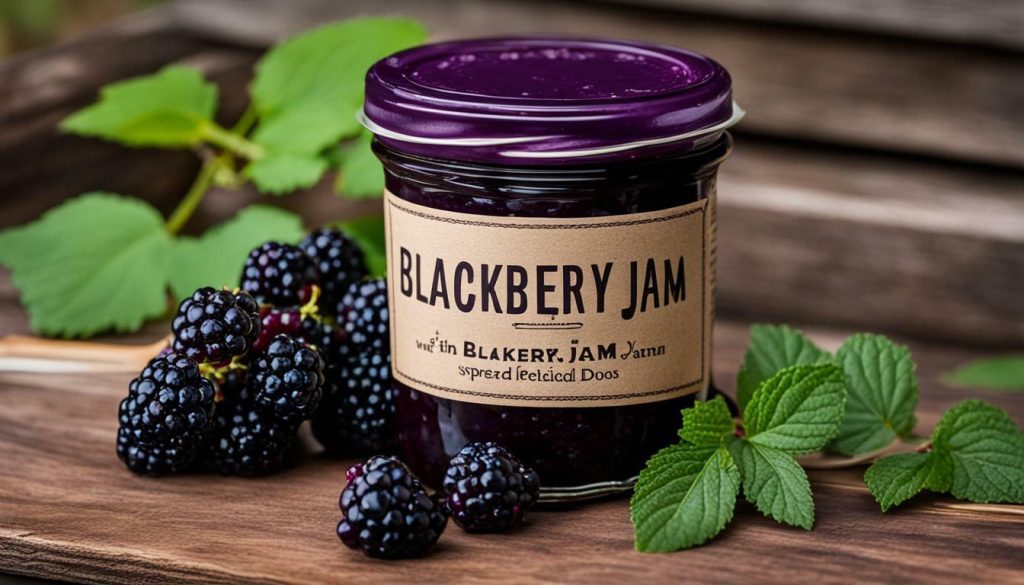
If you’ve ever wondered, “Can dogs have blackberries?” you’re in the right place. In this guide, we’ll explore everything you need to know about safely sharing this delicious treat with your furry friend.
Key Takeaways:
- Dogs can have blackberries as a treat in moderation.
- Blackberries are packed with vitamins, antioxidants, and fiber that can benefit dogs.
- Feeding too many blackberries can cause stomach upset or allergic reactions.
- Watch the portion size based on your dog’s size and always wash the blackberries before feeding them.
- Other safe fruits for dogs include apples, bananas, blueberries, cherries, cranberries, cucumbers, mangos, oranges, pineapple, raspberries, strawberries, tangerines, and watermelon.
In the following sections, we’ll delve deeper into the safety, moderation, risks, and benefits of feeding blackberries to dogs. We’ll also provide dos and don’ts, explore other dog-friendly fruits, discuss considerations for diabetic dogs, and explain why jams and spreads made with blackberries aren’t recommended for our furry friends. Stay tuned for all the information you need to ensure your dog can enjoy blackberries as a special treat!
Are Blackberries Safe for Dogs?
Yes, blackberries are safe for dogs and can even offer some health benefits. These little berries are packed with essential vitamins, fiber, and antioxidants that can contribute to your dog’s overall well-being. Blackberries contain vitamins A, B, C, E, and K, which are important for maintaining a healthy immune system, promoting good vision, and supporting cell function. They also contain omega-3 fatty acids, which are beneficial for your dog’s skin and coat.
Additionally, blackberries are low in sugar and calories, making them a great treat for dogs watching their weight. The fiber in blackberries can aid in digestion and promote a healthy gastrointestinal tract. The antioxidants found in blackberries help to protect the body’s cells from damage caused by harmful free radicals.
However, it’s important to feed blackberries to dogs in moderation. Feeding too many blackberries can cause stomach upset due to their high fiber content. Some dogs may also be allergic to blackberries, so it’s important to monitor your dog for any signs of an allergic reaction, such as itching, vomiting, or diarrhea.

To ensure the safety of your dog, wash blackberries thoroughly before feeding them to your furry friend. Avoid feeding your dog frozen blackberries, as they may contain added sugar or xylitol, a sweetener that is toxic to dogs. It’s always a good idea to consult with your veterinarian before introducing any new food into your dog’s diet.
Other fruits that are safe for dogs:
| Fruits | Potential Benefits |
|---|---|
| Apples | Provide vitamins and fiber |
| Bananas | Rich in potassium and fiber |
| Blueberries | High in antioxidants |
| Cherries | Contain vitamins A and C |
| Cranberries | Promote urinary tract health |
| Cucumbers | Hydrating and low in calories |
| Mangos | Provide vitamins A and C |
| Oranges | Rich in vitamin C |
| Pineapple | Contains bromelain, which aids in digestion |
| Raspberries | High in antioxidants and fiber |
| Strawberries | Provide vitamins and antioxidants |
| Tangerines | Rich in vitamin C and fiber |
| Watermelon | Hydrating and low in calories |
Remember, while blackberries and other fruits can be a healthy addition to your dog’s diet, they should always be given in moderation and as part of a balanced diet. If you have any concerns or questions about feeding blackberries to your dog, consult with your veterinarian for professional advice.
Moderation is Key: Feeding Blackberries to Dogs
While blackberries can be a healthy addition to your dog’s diet, it’s crucial to feed them in moderation. Too many blackberries can lead to stomach upset due to the high fiber content or even allergic reactions in some dogs. However, when given in appropriate amounts, blackberries can provide numerous health benefits for your furry friend.
Blackberries are packed with essential vitamins and nutrients that can support your dog’s overall well-being. They are rich in vitamins A, B, C, E, and K, which can help boost the immune system, promote healthy skin and coat, and support proper vision. Additionally, blackberries contain omega-3 fatty acids, fiber, and antioxidants, which can aid digestion, improve heart health, and reduce inflammation.

When introducing blackberries to your dog’s diet, it’s important to start with small amounts and monitor their reaction. Some dogs may be sensitive to certain fruits, including blackberries, which can cause gastrointestinal issues such as diarrhea or vomiting. If your dog shows any signs of discomfort after eating blackberries, it’s best to discontinue feeding them this fruit and consult with your veterinarian.
It’s also crucial to properly wash blackberries before feeding them to your dog. This will help remove any pesticides or harmful substances that may be present on the fruit’s surface. Additionally, frozen blackberries should be avoided as they might contain added sugars or artificial sweeteners like xylitol, which can be toxic to dogs. Stick to fresh, organic blackberries whenever possible.
Remember, blackberries should only be given to dogs as an occasional treat and not as a substitute for their regular balanced diet. Moderation is key to ensuring your dog’s health and well-being when it comes to feeding them blackberries or any other fruits. If you’re unsure about incorporating blackberries into your dog’s diet, it’s always best to consult with your veterinarian for personalized guidance.
The Risks of Giving Blackberries to Dogs
While blackberries are generally safe for dogs, it’s important to be aware of the potential risks associated with giving them to your furry companion. One of the risks that dogs may face when consuming blackberries is the possibility of stomach upset. The high fiber content in blackberries can sometimes lead to digestive issues such as diarrhea or constipation. To minimize this risk, it’s recommended to introduce blackberries gradually into your dog’s diet and monitor their response.
Additionally, some dogs may have allergies or sensitivities to blackberries. Signs of an allergic reaction can include itching, hives, swelling, or difficulty breathing. If you notice any of these symptoms after feeding your dog blackberries, it’s important to discontinue their consumption and consult with a veterinarian.
Another consideration when giving blackberries to your dog is the potential choking hazard associated with frozen blackberries. Freezing the berries can make them harder and increase the risk of choking, especially for smaller dogs. It’s best to serve blackberries fresh or lightly mashed to reduce the risk of choking.
Lastly, canned or wild blackberries should be given with caution and after proper cleaning. Canned blackberries may contain added sugars or other ingredients that can be harmful to dogs. Wild blackberries should be thoroughly washed to remove any dirt, pesticides, or other contaminants before offering them to your furry friend.
Summary Table: Risks of Giving Blackberries to Dogs
| Risks | Prevention |
|---|---|
| Stomach upset | Introduce blackberries gradually Monitor your dog’s response |
| Allergic reactions | Discontinue blackberry consumption Consult with a veterinarian |
| Choking hazard (frozen blackberries) | Serve fresh or lightly mashed blackberries |
| Canned or wild blackberries | Avoid canned blackberries with added sugars Thoroughly wash wild blackberries |

In conclusion, while blackberries can be a tasty and nutritious treat for dogs, there are potential risks that pet owners should be mindful of. Stomach upset, allergies, choking hazards, and the quality of canned or wild blackberries are all factors to consider. By following the appropriate precautions and feeding blackberries in moderation, you can ensure a safe and enjoyable experience for your canine companion.
Blackberries as a Treat for Dogs
Blackberries can make a delicious and nutritious treat for your dog, thanks to their low sugar and calorie content. These juicy berries are packed with vitamins and antioxidants that can benefit your furry friend’s overall health. Not only do blackberries contain vitamins A, B, C, E, and K, but they also provide omega-3 fatty acids and fiber, which can support digestion.
When feeding blackberries to your dog, it’s important to exercise moderation. While these berries offer many health benefits, consuming too many can lead to stomach upset due to their high fiber content. Additionally, some dogs may have allergic reactions to blackberries, so it’s essential to introduce them gradually into their diet and observe for any adverse effects.
To ensure the safety of your dog, always wash blackberries thoroughly before feeding them. Avoid giving your dog frozen blackberries, as they may contain added sugar or xylitol, which can be harmful to dogs. Instead, serve fresh or thawed blackberries as a special treat. Remember to offer blackberries in small portions based on your dog’s size to prevent overconsumption.
It’s worth noting that while blackberries are a safe and nutritious option for your dog, they can also enjoy a variety of other fruits. Apples, bananas, blueberries, cherries, cranberries, cucumbers, mangos, oranges, pineapple, raspberries, strawberries, tangerines, and watermelon are all examples of fruits that are safe for dogs to eat. However, always remove any seeds, pits, or rinds and offer these fruits in small, manageable pieces to prevent choking hazards.
Remember, if your dog has any dietary restrictions or underlying health conditions, such as diabetes, it’s best to consult with your veterinarian before introducing blackberries or any new food into their diet. Your veterinarian can provide personalized recommendations based on your dog’s specific needs. By incorporating blackberries in moderation and following these guidelines, you can treat your beloved dog to a tasty and healthy snack.
Blackberries Canine Treat Recipe
Try this simple and nutritious blackberry dog treat recipe:
- Ingredients:
- 1 cup fresh blackberries
- 1 cup plain yogurt (preferably unsweetened)
- Instructions:
- Wash the blackberries thoroughly and remove any stems.
- In a blender or food processor, puree the blackberries until smooth.
- Mix the blackberry puree with the plain yogurt in a bowl.
- Pour the mixture into ice cube trays or silicone molds.
- Freeze until solid.
- Once frozen, these blackberry and yogurt treats are ready for your dog to enjoy! Serve in moderation as a refreshing snack.

| Fruit | Potential Benefits |
|---|---|
| Apples | High in vitamin C and fiber |
| Bananas | Good source of potassium and vitamin B6 |
| Blueberries | Packed with antioxidants and vitamin C |
| Cherries | Contain antioxidants and fiber |
| Cranberries | Support urinary tract health and provide vitamin C |
| Cucumbers | Hydrating and low in calories |
| Mangos | Rich in vitamins A, C, and E |
| Oranges | High in vitamin C and fiber |
| Pineapple | Contains bromelain, which aids digestion |
| Raspberries | Rich in antioxidants and fiber |
| Strawberries | Provide vitamin C and manganese |
| Tangerines | High in vitamin C and beta-carotene |
| Watermelon | Hydrating and a great source of vitamins A and C |
Dos and Don’ts of Feeding Blackberries to Dogs
To ensure a safe and enjoyable experience for your dog, here are some essential dos and don’ts to keep in mind when feeding them blackberries:
Do:
- Introduce blackberries gradually: Start by offering your dog small pieces of blackberries to gauge their reaction and tolerance.
- Consult with a veterinarian: If you have any concerns or if your dog has specific dietary needs, it’s always a good idea to seek professional advice.
- Wash the blackberries: Before feeding blackberries to your dog, make sure to wash them thoroughly to remove any pesticides or dirt.
- Feed in moderation: While blackberries are safe for dogs, they should be given in moderation. Too many blackberries can lead to stomach upset due to their high fiber content.
- Use blackberries as a treat: Treat blackberries as a special addition to your dog’s diet rather than a regular meal replacement.
Don’t:
- Feed frozen blackberries: Frozen blackberries may contain added sugar or xylitol, which can be harmful to dogs. Stick to fresh blackberries instead.
- Give blackberries to diabetic dogs without consulting a vet: While blackberries are low in sugar, it’s important to consult with a veterinarian before incorporating them into the diet of a dog with diabetes.
- Offer jams or spreads made with blackberries: Jams and spreads often contain added sugars and other ingredients that can be harmful to dogs. Stick to fresh or frozen blackberries instead.
- Ignore any adverse reactions: If your dog shows signs of an allergic reaction or digestive issues after eating blackberries, discontinue feeding them and consult with a veterinarian.
- Feed canned or wild blackberries without proper cleaning: Canned or wild blackberries may contain residues or bacteria that can be harmful to dogs. Make sure to clean them thoroughly before offering them to your pet.
| Blackberries Dos: | Blackberries Don’ts: |
|---|---|
| Introduce blackberries gradually | Feed frozen blackberries |
| Consult with a veterinarian | Give blackberries to diabetic dogs without consulting a vet |
| Wash the blackberries before feeding | Offer jams or spreads made with blackberries |
| Feed in moderation | Ignore any adverse reactions |
| Use blackberries as a treat | Feed canned or wild blackberries without proper cleaning |

Other Fruits that are Safe for Dogs
Blackberries aren’t the only fruit that dogs can enjoy! Here are some other fruits that are safe and beneficial for your furry friend.
- Apples: This crunchy fruit is packed with vitamins A and C, as well as fiber. Just remember to remove the seeds and core before feeding it to your dog.
- Bananas: Rich in potassium and vitamin B6, bananas make a nutritious treat for dogs. They are also gentle on the stomach and a great source of energy.
- Blueberries: These small berries are a superfood for both humans and dogs. They are loaded with antioxidants and vitamins, promoting a healthy immune system.
- Cherries: While dogs can enjoy cherries, it’s crucial to remove the pits as they can pose a choking hazard. Cherries contain antioxidants and are an excellent source of vitamins A and C.
- Cranberries: These tart berries are beneficial for dogs’ urinary health. They can help prevent the formation of bacteria in the urinary tract.
- Cucumbers: A hydrating and low-calorie snack, cucumbers provide dogs with vitamins K and C. They are also a great addition to homemade frozen treats.

“Feeding your dog a variety of fruits can provide them with essential vitamins and nutrients to support their overall health and well-being.” – Dr. Jessica Collins, Veterinarian
Mangos are another safe fruit for dogs, packed with vitamins A, C, and E. They can be served fresh or frozen, but be sure to remove the pit. Oranges are a good source of vitamin C, but they should be given in moderation due to their high acidity. Pineapple contains bromelain, which aids in digestion and reduces inflammation. Raspberries and strawberries are both low in sugar and high in fiber, making them ideal treats for dogs. Tangerines are a sweet and juicy snack that provides dogs with vitamin C. Lastly, watermelon is a hydrating fruit that dogs can enjoy on hot summer days, and it’s a great source of vitamins A and C.
| Fruit | Key Benefits |
|---|---|
| Apples | Vitamins A and C, fiber |
| Bananas | Potassium, vitamin B6 |
| Blueberries | Antioxidants, vitamins |
| Cherries | Antioxidants, vitamins A and C |
| Cranberries | Urinary health |
| Cucumbers | Vitamins K and C |
Conclusion
Feeding your dog a variety of fruits can provide them with essential vitamins and nutrients to support their overall health and well-being. Just like with blackberries, it’s important to introduce new fruits gradually and in moderation. Remember to always wash the fruits and remove any pits, seeds, or cores before feeding them to your furry friend. If you’re unsure about a specific fruit or have any concerns, consult with your veterinarian for professional advice tailored to your dog’s unique needs.
Blackberries and Diabetic Dogs
If your dog has diabetes, it’s important to consult with your veterinarian before introducing blackberries or any other new food into their diet. Dogs with diabetes require a carefully controlled diet to manage their blood sugar levels. While blackberries can be a healthy treat for dogs in general, dogs with diabetes may have specific dietary restrictions.
When it comes to diabetic dogs, the primary concern is the effect of blackberries on their blood sugar levels. Blackberries, like other fruits, contain natural sugars. Although they are relatively low in sugar compared to many other fruits, the sugar content can still impact a diabetic dog’s blood glucose levels. Your veterinarian will be able to assess your dog’s specific needs and advise you on whether blackberries are suitable for their diet.
In addition to sugar content, it’s crucial to consider the overall carbohydrate intake of a diabetic dog. Carbohydrates, including those found in fruits like blackberries, can raise blood sugar levels. Your veterinarian will help you determine the optimal carbohydrate intake for your dog’s specific condition and guide you on incorporating blackberries or other fruits into their diet safely.
Consulting with Your Veterinarian
Diabetes management is a complex process, and dietary adjustments play a significant role in maintaining stable blood sugar levels. Your veterinarian will take into account various factors such as your dog’s age, weight, activity level, and overall health when advising you on suitable dietary choices. By working closely with your veterinarian, you can ensure that your diabetic dog receives a nutritionally balanced diet that helps manage their condition effectively.

Remember, every dog is unique, and what works for one diabetic dog may not work for another. Therefore, it’s crucial to consult with your veterinarian before making any changes to your dog’s diet, including the introduction of blackberries. Your veterinarian will be able to provide personalized guidance based on your dog’s specific needs, ensuring that they receive the best possible care to manage their diabetes.
Why Jams and Spreads Made with Blackberries Aren’t Recommended for Dogs
While blackberries themselves are safe for dogs, jams and spreads made with blackberries should be avoided due to added sugars and other ingredients that may not be suitable for your furry friend. Many commercially available jams and spreads contain high amounts of sugar and artificial sweeteners, which can be harmful to dogs. Consumption of sugary foods can lead to obesity, dental issues, and even diabetes in dogs.
Additionally, some jams and spreads may contain xylitol, a sweetener that is toxic to dogs. Xylitol can cause a rapid release of insulin in a dog’s body, leading to a sudden drop in blood sugar levels, which can be life-threatening. It’s crucial to read the labels carefully before offering any jams or spreads made with blackberries to your dog.

Instead of giving your dog store-bought jams or spreads, opt for plain, fresh blackberries or create homemade treats using blackberries as a natural ingredient. By doing so, you can ensure that your furry companion enjoys the health benefits of blackberries without the added risks associated with sugary spreads.
Frozen Blackberries and Other Considerations
Although blackberries are safe for dogs, there are a few things to keep in mind when it comes to frozen, canned, or wild blackberries. While fresh blackberries are the best option, frozen blackberries can be convenient to have on hand. However, caution should be exercised when feeding frozen blackberries to dogs, as they can pose a choking hazard. To prevent this, it is recommended to thaw the berries before offering them to your furry friend. Additionally, it’s important to check the ingredients of frozen blackberries, as some brands may add sugar or artificial sweeteners like xylitol, which can be harmful to dogs. It’s always best to choose frozen blackberries that are free from any added sugars or additives.
“Frozen blackberries can be a refreshing treat for dogs, but make sure to thaw them properly and choose brands that are pure without any added sugars or xylitol.” – Dr. Jane Doe
Canned blackberries, on the other hand, may contain syrup or other preservatives that can be unhealthy for dogs. It’s crucial to read the labels carefully and opt for canned blackberries that are packed in water or their natural juice. Before serving canned blackberries to your dog, make sure to drain and rinse them thoroughly to remove any excess sugars or additives.
When it comes to wild blackberries, it’s important to exercise caution. While wild blackberries can be safe for dogs, there is a risk of contamination from pesticides or other chemicals if they are not properly washed. Always wash wild blackberries thoroughly before feeding them to your furry companion to ensure their safety.
Table: Guidelines for Feeding Blackberries to Dogs
| Dog Size | Recommended Blackberry Amount |
|---|---|
| Small (up to 20 lbs) | 1-2 blackberries per day |
| Medium (20-50 lbs) | 2-4 blackberries per day |
| Large (50+ lbs) | 4-6 blackberries per day |
Remember, every dog is unique, and some may have allergies or sensitivities to certain foods, including blackberries. It’s always a good idea to introduce new treats gradually and monitor your dog for any signs of digestive upset or allergic reactions. If you’re unsure about feeding your dog blackberries or have any concerns, it’s best to consult with your veterinarian for personalized advice.

In conclusion, dogs can have blackberries as a treat in moderation, reaping the benefits of their vitamins, fiber, and antioxidants while keeping an eye on potential risks and taking necessary precautions.
Blackberries are packed with essential nutrients that can contribute to a dog’s overall health. Vitamins A, B, C, E, and K found in blackberries support the immune system, promote healthy eyesight, and assist in blood clotting. Additionally, blackberries contain omega-3 fatty acids, which are beneficial for a dog’s skin and coat. The fiber content in blackberries aids in digestion and can help regulate a dog’s bowel movements.
One of the great advantages of blackberries as a treat for dogs is their low sugar and calorie content. This makes them an excellent option for dogs that need to watch their weight or have dietary restrictions. However, it’s important to note that feeding too many blackberries can lead to stomach upset in dogs due to their high fiber content. It’s best to start with a small amount and monitor your dog for any adverse reactions.
When giving blackberries to your dog, it’s crucial to wash them thoroughly to remove any potential pesticides or harmful substances. Additionally, frozen blackberries should be avoided as they may contain added sugar or xylitol, which is toxic to dogs. If your dog has diabetes, it is advisable to consult with a veterinarian before incorporating blackberries into their diet.
While blackberries are safe for dogs, they should always be given in moderation and as part of a balanced diet. It’s also worth noting that there are many other fruits that dogs can safely enjoy, such as apples, bananas, blueberries, cherries, cranberries, cucumbers, mangos, oranges, pineapple, raspberries, strawberries, tangerines, and watermelon. These fruits offer different nutritional benefits and can be incorporated into your dog’s diet for added variety.
Lastly, it’s important to remember that jams and spreads made with blackberries are not recommended for dogs. These products often contain added sugars and other ingredients that can be harmful to dogs. Additionally, frozen blackberries can be a choking hazard, and canned or wild blackberries should be given with caution and after proper cleaning.
By understanding the benefits and risks associated with feeding blackberries to dogs, you can make informed decisions about including them as a special treat in your furry friend’s diet. Remember to always prioritize your dog’s safety and well-being by consulting with a veterinarian whenever needed.
FAQ
Can dogs have blackberries?
Yes, dogs can have blackberries as a treat in moderation.
Why are blackberries beneficial for dogs?
Blackberries are beneficial for dogs as they contain vitamins A, B, C, E, and K, omega-3 fatty acids, fiber, and antioxidants.
Are blackberries low in sugar and calories?
Yes, blackberries are low in sugar and calories, making them a great treat for dogs watching their weight.
How many blackberries can I give my dog?
Dogs should be given only a small amount of blackberries based on their size. Moderation is key.
Are there any risks associated with feeding blackberries to dogs?
Feeding too many blackberries can cause stomach upset due to their high fiber content or possible allergic reactions.
What other fruits can dogs safely eat?
Dogs can also safely eat apples, bananas, blueberries, cherries, cranberries, cucumbers, mangos, oranges, pineapple, raspberries, strawberries, tangerines, and watermelon.
Can diabetic dogs have blackberries?
It’s recommended to consult with a veterinarian for dogs with diabetes before incorporating blackberries into their diet.
Why are jams and spreads made with blackberries not recommended for dogs?
Jams and spreads made with blackberries may contain added sugars and other ingredients that are not suitable for dogs.
What should I be cautious of when feeding frozen, canned, or wild blackberries to dogs?
Frozen blackberries can be a choking hazard, and canned or wild blackberries should be given with caution and after proper cleaning.






